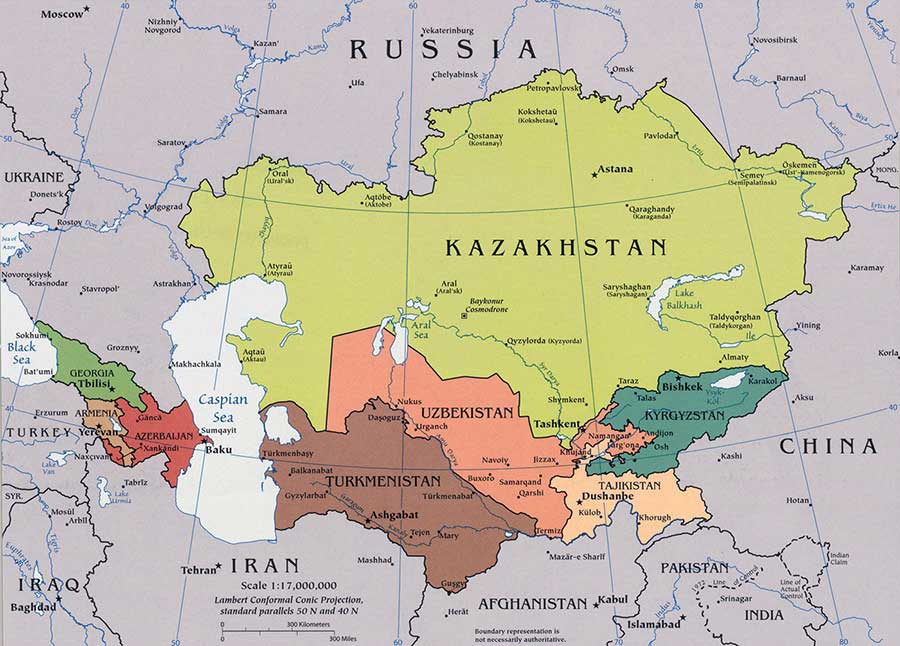Coronavirus Update In The Caucasus & Central Asia
Last updated June 11.
GEORGIA
As at June 11, Georgia had 828 confirmed cases of Covid-19 and 13 deaths, one of the lowest infection rates in the region. Georgia lifted a lockdown and a state-of-emergency at the end of May that had imposed travel restrictions and curfews around the country. As well as closing its borders and airports, the Georgian lockdown had closed its main cities, imposed a nighttime curfew, shut shops and restaurants. Some borders have reopened, but Georgia’s border with Armenia, among others is still closed. Economists have said that the closing down of Georgia’s increasingly important tourism industry will have one of the largest and most significant impacts on its economy. Georgian officials have said that they want foreign tourists to return from July 1. They want to market the country as being safe from Covid-19.
However the country has taken a huge financial hit, with the Lari losing 15% of value in 2020 and its two London listed banks losing 50% of their value. The Georgian economy is set to retract by 5% this year.
ARMENIA
14,669 people in Armenia have been infected with Covid-19 and 245 people have died, the Armenian authorities said on June 11. This is the highest infection rate in the Central Asia and South Caucasus region. Analysts have said that the number of cases of people confirmed to be infected with the coronavirus has risen in the past couple of weeks since some lockdown rules were relaxed. A state of emergency was imposed from March 16 and has now been extended until June 13.
Although the state-of-emergency has been extended, some of the key rules of the lockdown have been lifted. Schools, manufacturing businesses, shopping centres and gyms have been told that they can reopen. Public transport and cafes and restaurants have been allowed to reopen. PM Nikol Pashinyan said that although lockdown rules have been eased now, they will be reimposed if the infection rate starts to climb again. Armenia’s government said that it is compulsory for people to wear facemasks. The Armenian economy is expected to shrink by 3.5% this year.
AZERBAIJAN
Azerbaijan has reported 8,530 Covid-19 infections, with 102 deaths as at June 11. The country had imposed one of the harshest lockdown protocols, although it has not yet formally announced a state of emergency. From May 18, the harshest of these measures were lifted. Businesses, taxis and public transport have been closed. The EBRD said that the country’s GDP would shrink by 3% this year.
KAZAKHSTAN
As of June 11, Kazakhstan had recorded 8,345 cases and 67 deaths linked to Covid-19. Kazakhstan’s President Kassym-Jomart Tokayev lifted a state-of-emergency and a lockdown on May 11. Cafes, restaurants, shops and mosques have been allowed to reopen. Regional governments and city authorities have been told to slowly allow some businesses, under strict controls, to reopen. Travel has now been allowed between different regions of Kazakhstan. The EBRD has said that Kazakhstan’s economy would shrink by 3% this year.
KYRGYZSTAN
Kyrgyzstan has reported 2,093 infections of the coronavirus, including 26 deaths, as at June 11. Most have been reported in the south of the country and are blamed on pilgrims returning from the Hajj in Saudi Arabia. The highest concentration of confirmed coronavirus cases is in Osh and Jala-Abad. Officials said that around a fifth of the recorded cases of the coronavirus are health workers, highlighting the lack of personal protective equipment in Kyrgyzstan for health workers.
The Kyrgyz authorities lifted the country’s state of emergency at the beginning of May. As at now, most of the lockdown restrictions that had limited people’s movement, closed shops and markets have also been lifted excepting swimming pools and traditional banyas, considered higher risk infection places, which remain closed until later in the year. The EBRD has said that Kyrgyzstan’s economy would shrink by 4% this year.
TAJIKISTAN
As at June 11, the number of cases of Covid-19 in Tajikistan had risen to 4,763 with 48 deaths. Export bans on staple goods and products have been introduced since April 25 and are still in place. No lockdown has been imposed in Tajiksitan but, as well as closing schools, people have been encouraged to work from home, if they can. Cleaning of public spaces and transport has also been increased, the Tajik government said. Tajikistan’s parliament made it a criminal offence to spread the coronavirus and also handed police the power to impose fines on people not wearing a mask in public. Tajikistan’s government said that a fall in remittances from Russia, and to a lesser extent Kazakhstan, will wipe US$650m from its GDP. This represents a fall of about 8.1%.
TURKMENISTAN
Turkmenistan has not reported any cases of the coronavirus, although police have erected checkpoints going into Ashgabat. The government said that it was stopping freight from moving across the country during the coronavirus pandemic. Turkmenistan has closed its land borders with Iran, Uzbekistan and Afghanistan, while Turkmenistan Airlines suspended all its international services from April 13. It has recently blocked a WHO check. More information here.
UZBEKISTAN
Uzbekistan has said on June 11 that it now has 4,695 confirmed cases of the coronavirus. Nineteen people have died. The Uzbek authorities rolled out a lockdown across the country starting with Tashkent on March 24. It was reduced from mid-May and restaurants, businesses and cafes have been allowed to reopen under a staggered red, orange and green system that twill signify an areas infection level. Some mosques, in areas considered to be low risk, have reopened. Fitch, the ratings agency, said that Uzbekistan’s economy has been relatively resilient to the shock of the spread of the coronavirus. It said that the resilience was built on the government’s “robust external and fiscal buffers, a diversified commodity export base and access to external official financing”. It said that Uzbek GDP growth in 2020 would drop from 4.9% to 2%.
We are grateful to The Central Asia & South Caucasus Bulletin for their assistance with the data.
Related Reading
- Belt And Road Countries Affected By Covid-19
- Russia & Coronavirus: Business Updates
 Operating Your China Business During a Crisis and Contagious Disease Outbreaks
Operating Your China Business During a Crisis and Contagious Disease Outbreaks
Businesses across China were disrupted early this year due to the novel Covid-19 outbreak. The nature of this outbreak has led to some fast-thinking on the part of business organizations throughout the world – who have had to balance the quarantine conditions imposed with the need to resume normal work processes and await resumption of supplies.
About Us
Silk Road Briefing is written by Dezan Shira & Associates. The firm provides strategic analysis, legal, tax and operational advisory services across Eurasia and has done since 1992. We maintain 28 offices throughout the region and assist foreign governments and MNC’s develop regional strategies in addition to foreign investment advice for investors throughout Asia. Please contact us at asia@dezshira.com or visit us at www.dezshira.com






